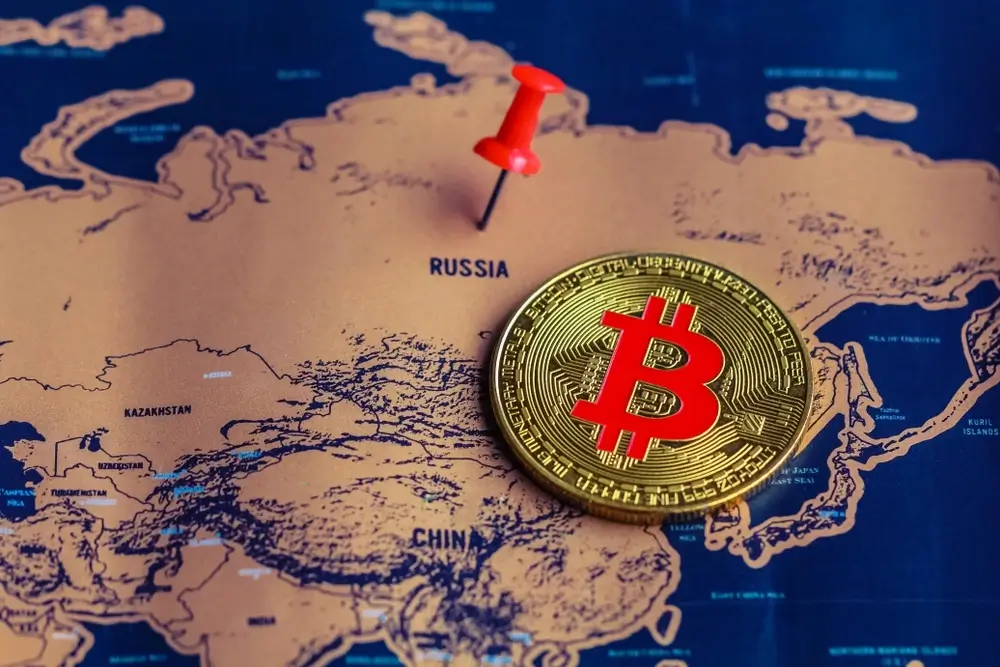Russia Embraces Bitcoin for International Trade Amid Sanctions
26.12.2024 11:00 2 min. read Alexander Zdravkov
Russia has made a bold move in embracing cryptocurrency, with businesses now using Bitcoin and other digital assets for international trade.
Finance Minister Anton Siluanov recently confirmed this shift, describing it as the foundation for a new era in global commerce.
This change marks a dramatic turnaround for a country that once imposed strict bans on cryptocurrency transactions. Initially cautious due to concerns over stability and illegal activities, Russia softened its stance in 2020 but kept crypto out of traditional payments. Now, facing economic sanctions and restricted trade channels, the government has legalized mining and cross-border crypto payments to bypass conventional systems.
In 2023, Russia mined 54,000 Bitcoins, generating $550 million in tax revenue. Favorable conditions like cheap electricity and cold climates have made it a top global mining hub, second only to the U.S. However, to manage the strain on energy resources, mining bans in ten regions, including Dagestan and Chechnya, will take effect in 2025, along with seasonal restrictions in high-demand areas like Irkutsk.
President Vladimir Putin has positioned Bitcoin as a decentralized alternative to the U.S. dollar, criticizing the latter’s politicization. Meanwhile, Russia ranks seventh in global crypto adoption, with Eastern Europe handling nearly $500 billion in crypto transactions over the past year. As traditional banking systems falter under sanctions, cryptocurrencies are becoming a key part of Russia’s strategy for economic resilience and global trade.
-
1
Bitcoin Reaches New All-Time High Above $116,000
11.07.2025 7:56 1 min. read -
2
What’s The Real Reason Behind Bitcoin’s Surge? Analyst Company Explains
12.07.2025 12:00 2 min. read -
3
Canadian Bank Sees Bitcoin Hitting $155,000 by 2025
15.07.2025 10:00 1 min. read -
4
Peter Schiff Warns of Dollar Collapse, Questions Bitcoin Scarcity Model
12.07.2025 20:00 1 min. read -
5
Strategy Claims It Can Weather a Bitcoin Crash to $20K Without Trouble
16.07.2025 14:08 1 min. read
Where Is The Smart Entry Point For Bitcoin Bulls?
With Bitcoin hovering near $119,000, traders are weighing their next move carefully. The question dominating the market now is simple: Buy the dip or wait for a cleaner setup?
Matrixport Warns of Bitcoin Dip After Hitting This Target
Bitcoin has officially reached the $116,000 milestone, a level previously forecasted by crypto services firm Matrixport using its proprietary seasonal modeling.
Bitcoin Risk Cycle Flips Again as Market Enters Safer Zone
Bitcoin’s market signal has officially shifted back into a low-risk phase, according to a new chart shared by Bitcoin Vector in collaboration with Glassnode and Swissblock.
Robert Kiyosaki Warns of 1929-Style Crash, Urges Bitcoin Hedge
Financial author Robert Kiyosaki is once again sounding the alarm on America’s economic health.
-
1
Bitcoin Reaches New All-Time High Above $116,000
11.07.2025 7:56 1 min. read -
2
What’s The Real Reason Behind Bitcoin’s Surge? Analyst Company Explains
12.07.2025 12:00 2 min. read -
3
Canadian Bank Sees Bitcoin Hitting $155,000 by 2025
15.07.2025 10:00 1 min. read -
4
Peter Schiff Warns of Dollar Collapse, Questions Bitcoin Scarcity Model
12.07.2025 20:00 1 min. read -
5
Strategy Claims It Can Weather a Bitcoin Crash to $20K Without Trouble
16.07.2025 14:08 1 min. read


